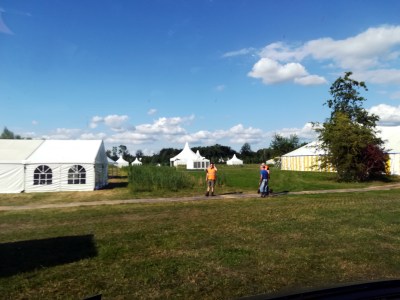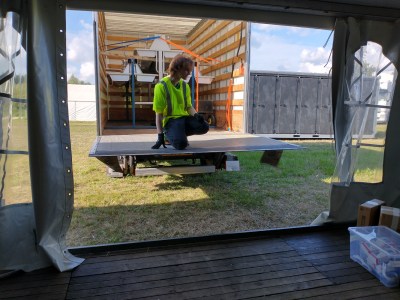
Long-time readers of Hackaday will know that we attend quite a few events, including summer hacker camps. Here in Europe this year there are two large events, the British Electromagnetic Field, and the Dutch MCH, or May Contain Hackers. These events are put together by volunteers from within the community, and as part of the MCH setup I noticed they needed drivers for their off-site logistics. I have a licence to drive medium-sized trucks in Europe so it seemed like a perfect fit. I traveled early on the first set-up day to the Dutch city of Utrecht, and found myself behind the wheel of a large Volkswagen box van. My brief career as a trucker had begun!
An Empty Field Of Dreams

The Netherlands is a relatively small country and the MCH site at Zeewolde is roughly in its centre, so while the traffic could be heavy the distances weren’t large by American or even British standards. There were however a wide variety of loads waiting for me and my fellow driver, and a few obstacles such as the hottest days of the year and angry Dutch farmers blockading the roads. If you’re interested in the logistics behind a large hacker camp then our journeys provided an insight that maybe wandering around the field doesn’t quite deliver.
Arriving on site on the first day gives a perspective on how much of the infrastructure comes from specialist contractors and thus isn’t delivered by the hackers. Articulated trucks from the marquee company were disgorging the main tents, with their crews expertly assembling them in record time. The toilets and showers were arriving as self-contained hook lift container units, and yet more contractors were delivering fencing or tables and chairs. I can add the power infrastructure to this list, but due I’m told to delays at another event this wasn’t on site on the first day.
Hackers Move Some Surprising Things

Amid all this heavy lifting, what’s left for the off-site transportation crew? There were still a few camp infrastructure loads, for example I brought a couple of vanloads of hand washing sinks up from the far south-eastern corner of the country.
Beyond that were loads more in the vein of a hacker camp, stuff that you’d find at no other event. My fellow driver moved a pile of network infrastructure from a Dutch hackerspace and a precious load of retrocomputing hardware from the Home Computer Museum in Helmond, while I shifted more than one consignment of the incredible eye candy into which the deco team had put so much work. From the smoke-breathing dragon to the crystal lighting and more, it was all assembled within our community, in homes and hackerspaces across the Netherlands.
As more people came to help assemble the camp our little team grew and more vans were hired, to the point at which we could have formed a tidy little haulage operation had we been foolhardy enough to do so. The extra hands were very welcome indeed during the more restricted timing demanded by teardown, during which I was unlucky enough to spend half a day stuck on a motorway blocked with piles of manure by those farmers.
If you’ve ever been to a hacker camp and wondered how everything came together then from my ringside seat in a Volkswagen box van I hope I’ve given you some idea. A huge amount of work from contractors and volunteers goes into creating these events, and I would tell any of you to give volunteering during set-up and teardown a go some time if you’d like to prolong your hacker camp experience. It can be very hot and hard work, but as a way to meet and make friends it’s second to none. Perhaps I’ll be back behind the wheel again next time.
What Goes Into A Hacker Camp
Source: Manila Flash Report
0 Comments